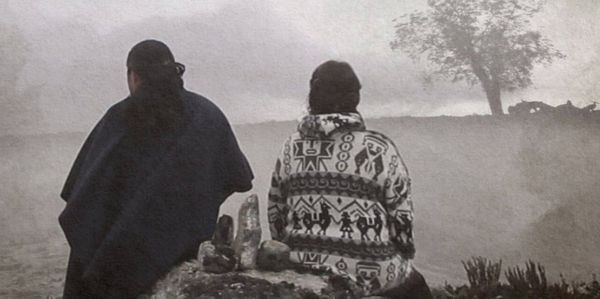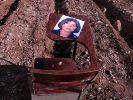Eye For Film >> Movies >> The Silence Of The Flies (2013) Film Review
The Silence Of The Flies
Reviewed by: Jennie Kermode

On the remote, misty slopes of the Venezuelan Andes, suicide is common, and it's getting more so. Exactly why is hard to establish. Perhaps there's something in the subtle breakdown of old hierarchies, making farmers feel less and less financially secure. Perhaps it's the weight of old traditions combined with new ways of thinking that drift up to the mountains from far-off, seemingly unreachable cities - the awareness that life doesn't have to be like this when it still is. One thing that's certain is that these deaths are devastating communities. The men go, at all ages; the young women go; the older women are left to carry the burden of loss.
Marcelina and Mercedes are two of those women, among many speakers in this poignant documentary. We follow them through the wild landscape as they reflect on who their children were and what might have gone wrong. Unyielding gender roles seem to be part of it. One man talks of his father's decision to kill himself the day he stopped being able to get an erection. A mother reflects on early conflicts on her daughter's desire to have short hair, in a world where women's long tresses are a sign of their father or husband's control. Part of the tragedy of it is that nobody actually seems to value these rules more than they valued their loved ones; they just couldn't express as much whilst their loved ones were still alive.

The stoicism in which this is rooted seems itself to be an important survival trait. The soil up here is thin, the work hard. The cyclical nature of time on which peasant life depends clashes awkwardly with notions of progress and change elsewhere. It's pesticide, mostly, that the men use to kill themselves - a nasty way to go, but one also commonplace in India and sub-Saharan African countries. For the women, it varies. There are cliff edges everywhere, yet nobody seems to jump, suggesting a mental separation of the act of escape from the everyday.
Where do they go, these lost ones? This land seems closer to the other side than many. Friends talk of seeing them in dreams, mothers of trying to sense them nearby every day. Trees are strung with mementos: a football shirt, a book, cassette tapes, a dirt-encrusted hoe. One day the wind will carry these things away.
The voices of the bereaved come through clearly in this sensitive film, whilst fragments of art and writing carry those of the deceased. There is a sense of slow transition; as the dead inch further away, perhaps these communities are gradually moving toward a place where there is hope, where this desperation is over. It's the unnaturalness of it that really gets to the mothers, the sense that something has been stolen. This is a portrait of a timeless imagining, interrupted.
Reviewed on: 13 Oct 2015














